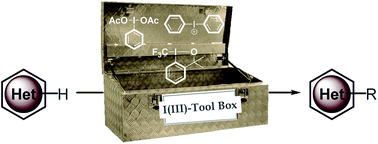Late stage functionalization of heterocycles using hypervalent iodine(iii) reagents
Abstract
Late stage functionalization (LSF) through direct X–H manipulations (X = C, N) enables synthetic chemists to accelerate the diversification of natural products, agrochemicals and pharmaceuticals allowing rapid access to novel bioactive molecules without resorting to arduous de novo synthesis. LSF does not only allow tapping of the hitherto unexplored chemical space but also renders the synthetic sequence more straightforward, atom economical and cost-effective. In this regard, the recent decade has witnessed the emergence of hypervalent iodine(III) reagents as a powerful synthetic tool owing to their easy availability, mild reaction conditions, remarkable oxidizing properties and high functional group tolerance. Iodine(III) reagents have tremendous applications in the regio- and chemo-selective late-stage functionalization of a diverse variety of heterocycles through an exciting range of transformations, such as oxidative amination, cross-dehydrogenative coupling (CDC), fluoroalkylation, azidation, halogenation and oxidation. The present review, classified according to the types of synthetic methods involved, encompasses all these recent developments in the field of transition-metal-free iodine(III)-catalyzed/mediated direct functionalizations of heterocycles with representative examples and insightful mechanistic discussions.

- This article is part of the themed collections: Synthetic methodology in OBC and Direct C-H Functionalization in Method Development and Late Stage Functionalization


 Please wait while we load your content...
Please wait while we load your content...